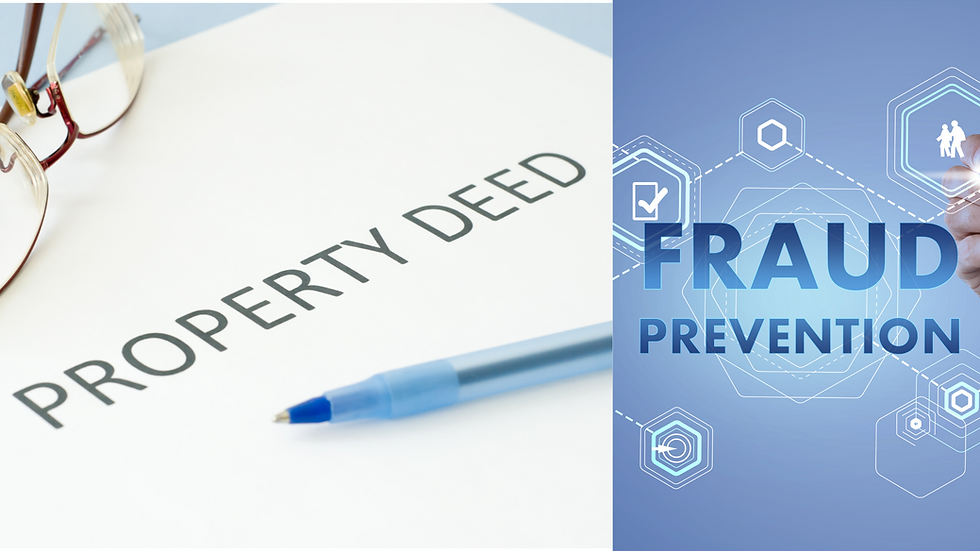Defending Your Home: 7 Strategies to Thwart Deed Fraud
- Brian Klein

- Jan 8, 2024
- 4 min read

If you follow Blue Ink Notary on social media, you know I have posted in the past about deed fraud. Today, we'll dive into this crucial topic and provide you with seven preventative measures to thwart deed fraud while shedding some light on what deed fraud is, how it can happen, and some crucial clues that may indicate its occurrence. Let's navigate the landscape of property security together to safeguard your most valuable investment.
What is Deed Fraud?
Deed fraud is a cunning act where individuals or entities attempt to illicitly transfer property ownership without the rightful owner's knowledge or consent. This deceptive practice involves forging signatures, creating fraudulent documents, or manipulating public records. The consequences can be dire, leading to financial losses and lengthy legal battles to reclaim your property.
How Does Deed Fraud Happen?
Here's how it works. Scammers select a property - many times a second home, rental property, vacation home or a vacant house to steal. The scammer will then use your personal information which they acquired from the internet or elsewhere to assume your identity or claim to represent you. Next, using forged signatures and fake IDs, the scammer files paperwork with the county’s recorder of deeds to transfer ownership of your property to themselves or another party. The home is then sold or a loan is taken out against it, stealing your equity. When payments on the loan secured by your property are not made, you could end up in foreclosure or be unable to sell, refinance or pass the home on to heirs.

Understanding the ways fraudsters can acquire your personal info can help prevent it from happening:
Phishing - Scammers will send emails or letters that appear to be from a bank or a government agency or even by calling the homeowner and pretending to be someone they’re not, attempting to get access to your information.
Data Breach - Hackers break into an organization's database to get access to your details.
Unsecured WiFi Systems - If your home WiFi system is not protected with a highly secure password or if you are using public WiFi, scammers may be able to access the information on your device or home network.
Mail Theft - Thieves may actually steal the mail right from your mailbox and use that info to then create their alias.
Theft or Loss of Documents - If you lose or someone breaks into your home to steal your important documents, that info can then be utilized to commit the fraud.
Clues That Deed Fraud May Have Occurred
Recognizing the potential signs of deed fraud is key to early detection and mitigation. Homeowners should be alert to the following clues:
Unexplained Changes in Property Records - Unexpected alterations in ownership details or property records should raise immediate concerns.
Missing or Altered Documents - Misplaced or modified physical or digital property documents could indicate fraudulent activities.
Unexpected Communication Regarding Property Transactions - Receiving unfamiliar notices or communications related to property transactions may signal fraud attempts.
Unauthorized Access to Online Accounts - If you notice unauthorized access or changes to your online property management accounts, investigate promptly.
You stop receiving utility or tax bills - If you stop receiving utility bills or tax bills for your property, it may indicate fraud had been perpetrated.
Receiving an IRS notice that you have unpaid taxes - You can be sure the scammer won't pay the property taxes. If you've been current with payment in the past and a notice arrives, this could be a hint of fraud.
Being denied credit because of unknown activity on your credit report - If you apply for a new credit card or a loan and it is denied due to late or missed payments, this could be another fraud indicator.
Utility bills on a vacant property suddenly increase, or you find people living there - If your property is vacant or used seasonally and suddenly you receive utility bills with higher than normal amounts due, someone may be occupying your property without your knowledge.
Now, armed with these insights into what deed fraud is, how it happens, and its potential clues, let's explore proactive measures to safeguard your property.
7 Practical Strategies to Thwart Deed Fraud:
Choose a Reliable Notary Service - Begin on a secure foundation by selecting Blue Ink Notary for rigorous document verification and closing services.
Promptly Record Your Deeds - Swiftly record property deeds with the county clerk's office to establish a public record, deterring manipulation.
Regularly Check Public Records - Use online tools to monitor public records for unauthorized changes or suspicious activities.
Secure Physical Copies - Safeguard physical copies in a secure location and consider digitizing documents for added protection.
Implement Two-Factor Authentication - Enhance online security by enabling two-factor authentication on relevant accounts.
Use a service like Title Lock - Title Lock monitors a variety of data sources for you and alerts you when fraud is detected and will help to rectify the fraud as well.
Invest in Title Insurance - Secure comprehensive protection through an owner's title insurance policy from a reputable title insurance company. Need a referral? Blue Ink Notary can help!
By understanding what deed fraud is, how it happens, recognizing the potential clues, and implementing these proactive measures, you are taking significant steps to secure your property. Blue Ink Notary is committed to assisting you in this journey by providing secure closing services and proper handling of your closing documents - ensuring your peace of mind and the enduring safety of your investment. Stay vigilant, stay secure, and let Blue Ink Notary be your trusted ally in the defense against deed fraud!
Buying, selling or refinancing your home and need a traveling notary to assist with your closing documents? Get in touch to schedule your closing by contacting us via phone at 484-509-1405 or by email to brian@blueinknotarypa.com.










Comments